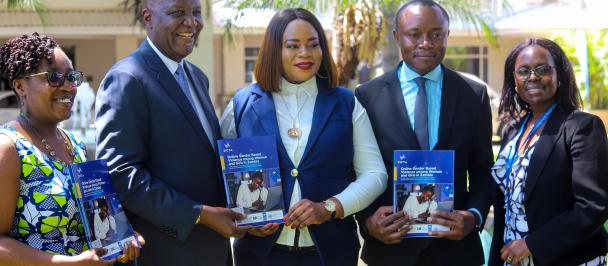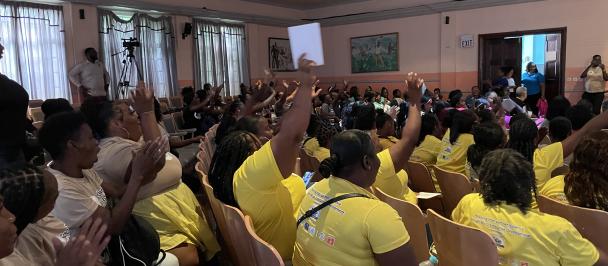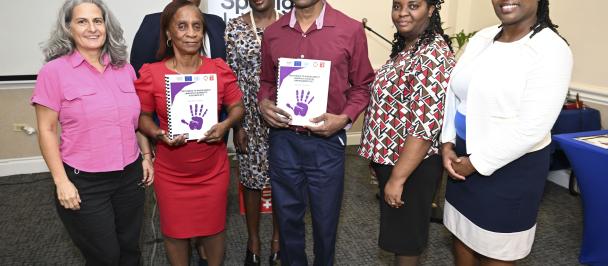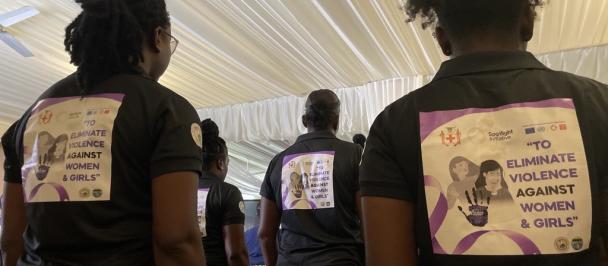First Anniversary of the High-Level Political Compact
October 27, 2022
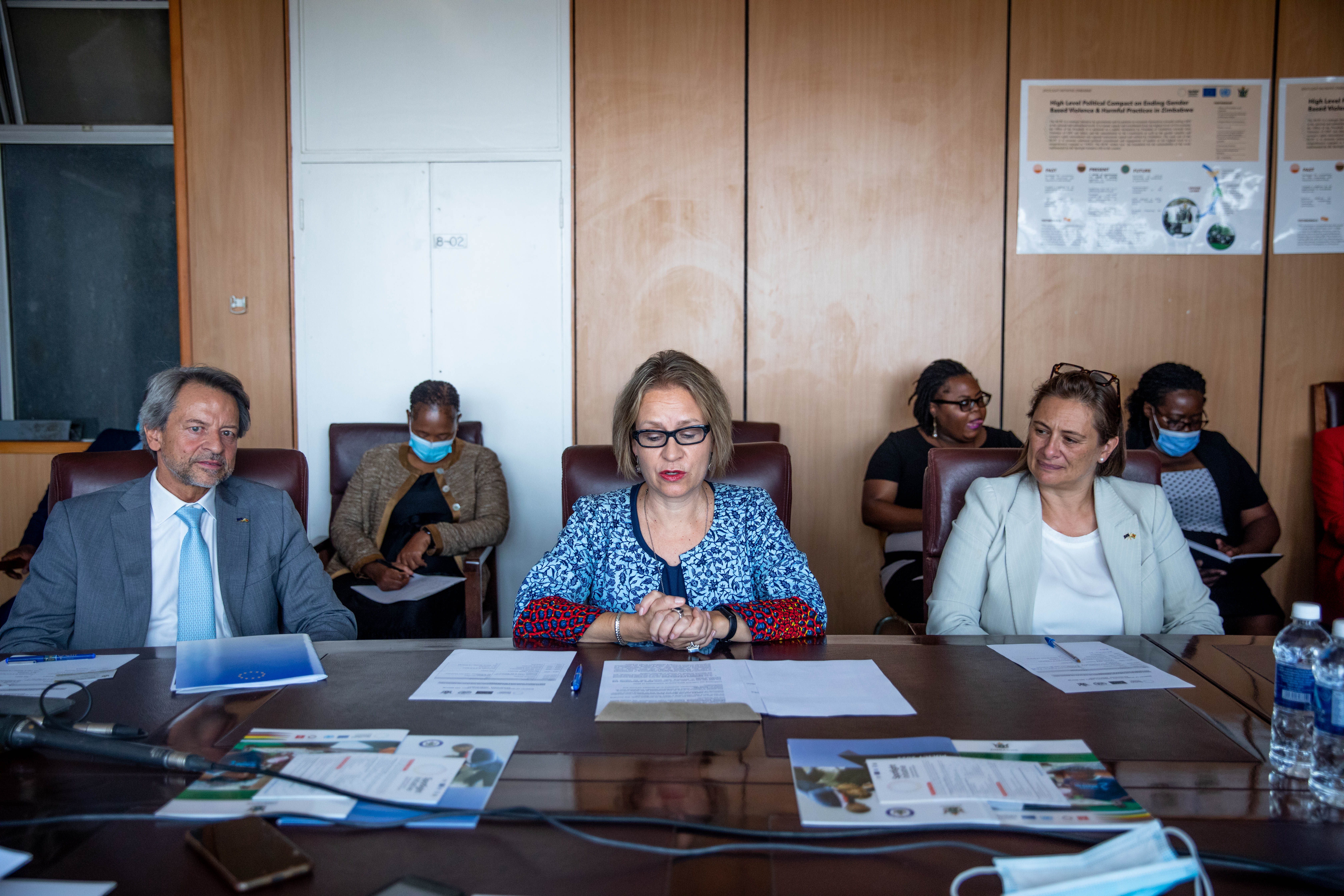
Remarks at the Commemoration of the 1st Anniversary of the High-Level Political Compact
It is my pleasure to say a few words on the first anniversary of the High-Level Political Compact which is a reminder of our collective commitment towards eliminating gender-based violence in all its forms and our resolve towards women economic empowerment and gender equality. These ideals matter. As we commemorate today, let us reflect on the successes that we have achieved together, the challenges we must overcome and the opportunities that we must take advantage of.
Honorable Minister, ladies and gentlemen,
Let me begin by congratulating the Government of Zimbabwe and the Honourable Minister of Women Affairs, Community, Small and Medium Enterprise Development, Dr. Sithembiso G.G. Nyoni for your leadership and oversight during the first year of operationalizing and implementing the commitments under the Compact.
I am informed you participated in the stakeholder consultative meetings in Bulawayo and Harare. Thank you for leading from the front and congratulations to you and your team.
I also want to acknowledge His Excellency the Ambassador of the EU and the EU member states who through the Spotlight Initiative in Zimbabwe are key partners in the elimination of GVB in Zimbabwe. This has indeed made a difference. The results we will highlight today have been achieved thanks to six UN Agencies (ILO, UNDP, UNESCO, UNFPA, UNICEF and UN WOMEN), 55 civil society Implementing Partners, Government Ministries, Independent Commissions, Parliament, Justice and Legal Institutions, the Private Sector and the Academia.
Thanks also to the Media for your reporting on progress made and sounding the alarm about GBV cases using a victim centred approach.
Thanks to the UNFPA and UN Women Representatives for your steadfast leadership of our effort to end GBV and the SI and for joining here in person.
The shared achievement of the SI was recognized at the Global Learning Symposium in Mexico, where the Zimbabwe Spotlight Programme won an award on fortitude. Congratulations, Makorokoto, Amhlophe to all Spotlight partners and stakeholders.
Celebrating the collective gains towards achievement of SDGs
The past year has been seen several noticeable gains, achievements, and success stories in addressing SGBV issues at both the national and subnational levels.
- At the legislative and policy level, we have witnessed the enactment of the Marriages Act, the launch and rollout of the Public Service Sexual Harassment Policy, the Public Service Sexual Harassment Module, and the National Strategy on women in decision making.
- Investments have been made towards strengthening or establishment of institutions that provide services to GBV survivors. Key examples include the development of child and victim friendly courts, establishment of national SGBV call centres, establishment and strengthening of mobile and static one stop centres. The installment of state-of-the-art DNA forensic lab makes it easier for law enforcement to generate evidence in bringing perpetrators of GBV to justice.
- SI facilitated strong mobilization of women’s movement and active grassroots/community engagement to end SGBV. These grassroot engagements include: Youth Innovators Against SGBV, traditional and religious leaders, and men and boys under the HE4She campaign.
The establishment of Safe market places has facilitated socio-economic empowerment of women. The fight against SGBV can only be won when women and girls have equal access and opportunities in the social, economic and political spheres.
The HLPC brings an all-government and all-society approach to make this happen.
Going forward, the results achieved through the Spotlight Initiative partnerships set us on course towards the achievement of the national commitments espoused in the HLPC.
Honourable Minister, Ladies and gentlemen, we have miles and miles to go.
GBV remains a serious challenge and impacts negatively on the country’s advancement and achievement of gender equality and women’s empowerment and threaten to set the clock back on women’s rights and gender equality. The recent death of 15-year-old Nokutenda Hwaramba, while giving birth at a shrine in Bikita is a stark reminder. The national inquiry on child marriages conducted by the Zimbabwe Gender Commission provides evidence that there are still numerous cases of child marriages, a harmful practice that we must overcome.
Now more than ever is the perfect opportunity to build on the steps that have already been laid under the HLPC and sustain the momentum towards a GBV free society. To this end, ladies, and gentlemen, we all have a role to play.
Let us undertake the challenging work of transforming the structures and changing harmful practices that allow GBV to happen in the first place.
As we are meeting at a time of public consultations on the national budget, the HLPC contributes to the national conversations on how best to increase financial investment in GBV prevention. By so doing, we can start to reduce the immense health, legal and productivity costs that the country continues to incur because of GBV.
The HLPC provides the roadmap to a more inclusive, equitable and well- resourced GBV response in Zimbabwe.
Zimbabwe’s commitment to gender equality includes 50-50 representation by 2030. This is the time for political parties to ensure gender parity as they prepare to field candidates for elected offices for the tripartite elections in 2023 of an inclusive Zimbabwe.
Let us double our efforts and strengthen our partnerships to achieve the commitments in the Compact in line with NDS1 and 2030 Agenda for Sustainable Development as well as Zimbabwe’s vision to become upper middle-income society by 2030.
I thank you for listening.

 Locations
Locations